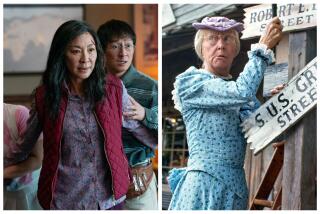Science Helps Italian Woman Give Birth at 62
- Share via
A 62-year-old Italian woman who became pregnant with the help of sophisticated embryo donation techniques gave birth to a boy Monday--an event that made medical history but also promised to revive an ethical debate about the maximum age for motherhood and whether “granny pregnancies” should be restricted.
Rosanna Della Corte delivered her son--healthy at 7 pounds, 4 ounces--by Cesarean section under the supervision of a controversial fertility specialist who last year helped a 59-year-old British woman give birth to twins.
This apparently makes Della Corte the world’s oldest woman to give birth.
“Today is a great day in Italy for women, for individual liberty,” her physician, Severino Antinori, proclaimed to reporters in announcing the birth. “To want to have a child is a personal choice, and to be able to have it at any age is now possible.”
But medical ethicists--as well as some of Antinori’s colleagues in the fertility field--have long expressed serious concerns about this trend in pushing the frontiers of pregnancy.
The debate raises delicate questions: Can, or should, society set age limits on parenthood? Nobody complains when older men become fathers, so why can’t an older woman become a mother? On the other hand, is it proper for doctors to defy nature by assisting post-menopausal women in giving birth--knowing they will not be able to nurse their babies, may not have enough energy to raise them and may not even live long enough to see them graduate from high school?
“On this particular issue, we don’t have very much of a well-thought-through analysis or anything like a consensus,” said Alexander Capron, a professor of law and medicine at USC who is the author of six books on medicine and public policy.
Capron said he would have “a lot of discouraging words” for a 50- or 60-something woman considering becoming pregnant. “The very fact that it has been something men have done for a long time doesn’t make it right,” he added.
Still, he said, he thinks it would be difficult--and probably unwise--for the United States to try to control the practice through legislation.
But elsewhere governments are trying to do just that.
After the birth of the British twins last year, Health Minister Virginia Bottomley declared that in-vitro fertilization and other high-tech fertility procedures would not be allowed in Britain for post-menopausal women. Not all women “have the right to have a child,” she said.
In Germany, in-vitro fertilization with donated eggs is prohibited outright. In France, the Parliament gave final approval last month to a bill that sets strict limits on test-tube births, restricting artificial fertilization to couples of child-bearing age who are heterosexual and infertile.
In Italy, where Antinori maintains a clinic in Rome, a government ethics commission last month recommended curbs similar to those adopted in France. The Italian guidelines came amid a controversy over a lesbian who had a baby after being artificially inseminated.
But the recommendations are non-binding, allowing Antinori to continue his work, which draws post-menopausal women to his clinic.
In Della Corte’s case, Antinori said he used the sperm of the woman’s husband--who is in his 60s--to fertilize the eggs of an anonymous donor. The fertilized embryo was then implanted in Della Corte’s uterus.
According to Italian news reports, Della Corte has said she wanted a baby after her only child, Riccardo, 17, was killed three years ago while riding his motor scooter. She was quoted as saying that she and her husband tried to adopt but were turned down because of their age.
“If Riccardo were still here, I would never be doing this,” she told the Reuters news service in December. She named her new baby Riccardo.
While Antinori said he decided to help Della Corte become pregnant after determining that she was healthy and had a good chance of living at least 25 more years, other fertility pioneers have said they would not do the same.
Among them is Mark V. Sauer, a renowned fertility specialist at USC. Last year, in a study published in the British journal The Lancet, Sauer reported that women older than 50 stand a good chance of giving birth to healthy babies with the help of embryo donation techniques. But Sauer said he did not plan to try the technique with women in their 60s.
“I don’t want to have a bunch of orphaned children here,” Sauer said.
As to whether news of the Della Corte birth will prompt a rash of similar pregnancies, Capron, the USC ethicist, said: “It seems to me highly unlikely that there is a huge number of post-menopausal women just dying to be pregnant.”






